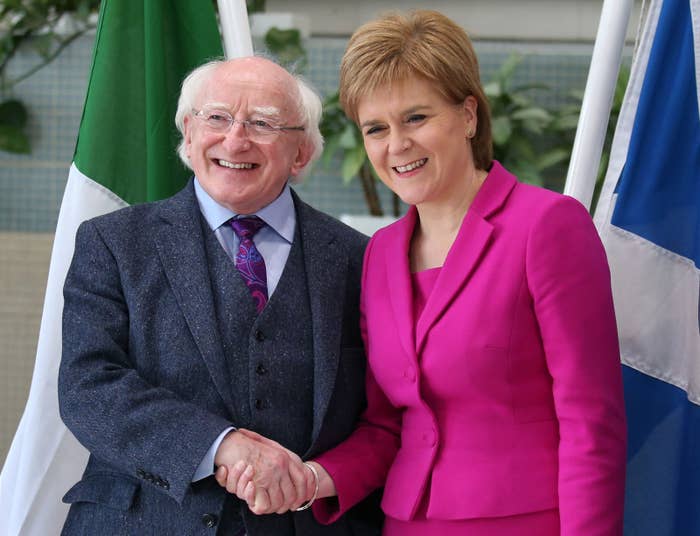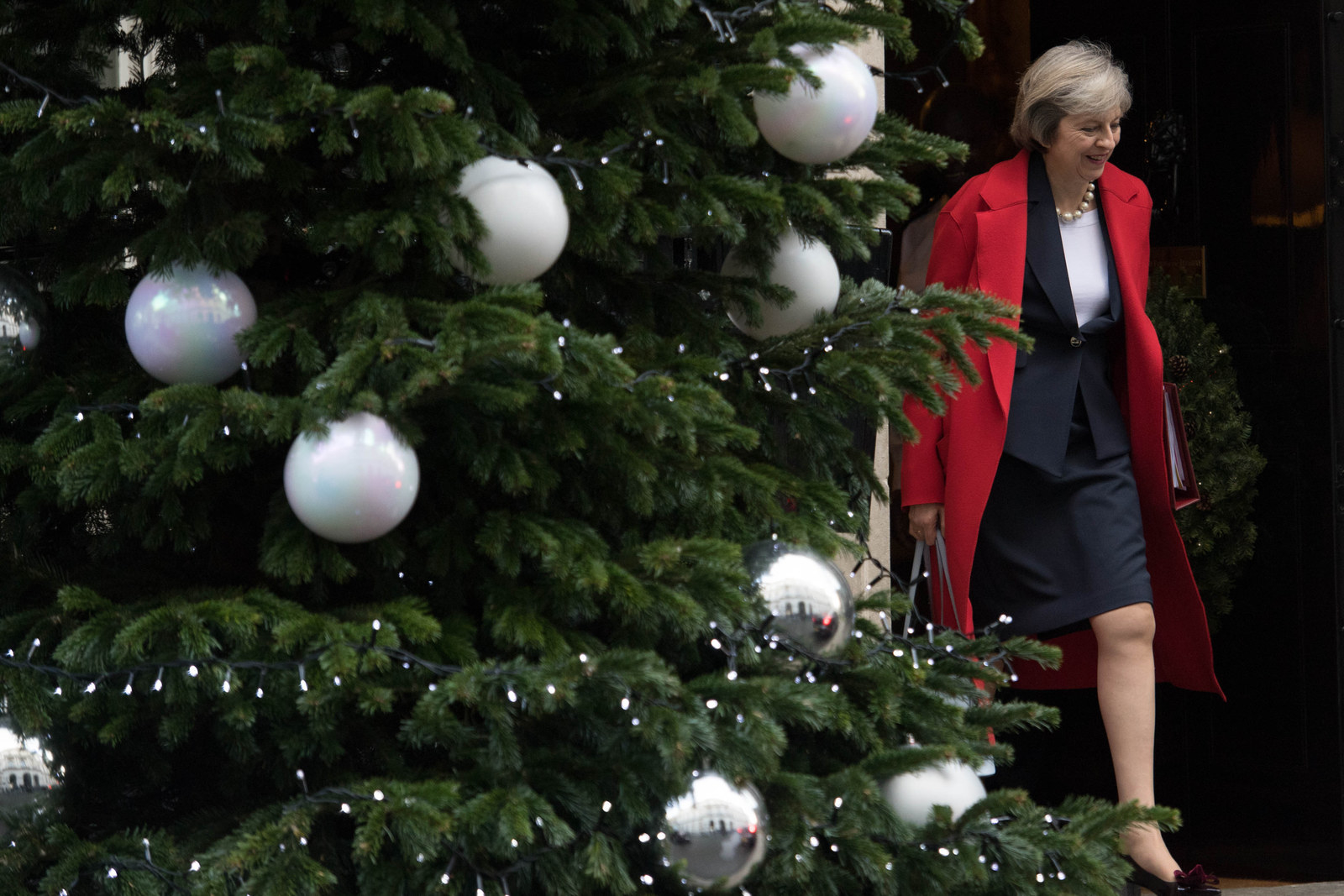
Irish politicians have pledged to keep Scotland high on the agenda in Brexit discussions with other EU members to ensure its voice isn't drowned out by the Westminster government.
Several members of the Irish parliament's EU select committee have told BuzzFeed News they'll essentially act as ambassadors for Scotland's cause at EU meetings to make sure other members are fully aware it voted overwhelmingly to remain in June's referendum.
Since the referendum, there's been a huge increase in communication between the Irish and Scottish parliaments. The Scottish government has established an office in Dublin for the first time and, according to Irish government sources, its delegation in Edinburgh has doubled in size since 23 June.
The parliament's joint committee on the EU constantly engages with other EU member states, and its members told BuzzFeed News they've taken on the responsibility of representing the interests both of Scotland and Northern Ireland, which also voted Remain.
"We’re worried the other EU members are ignorant to the internal dynamics of the UK," said senator Neale Richmond of the Fine Gael party. "Ireland is going out of its way to keep the position, firstly of Northern Ireland because we have a constitutional commitment to them, but secondly of Scotland on the agenda.

"That's not only in respect of our close ties, but to recognise that the majority of Scots voted to stay in and we shouldn’t punish them for the votes of Wales and England. There’s an awful lot of ignorance among continental European states to the situation."
Richmond added: "Ireland sees itself as having responsibility for the parts of the UK that might be left out of negotiations." He said the country was not acting as "some great benevolent little brother off the coast; we’re doing it because it’s in our strategic interests – politically and economically."
Scotland's first minister, Nicola Sturgeon, received a standing ovation in the upper house of the Irish parliament – the Seanad – during a visit in November. She explained she wants Scotland to remain in the EU, but if that's not possible she wants to retain membership of the single market in a so-called "soft Brexit".
However, several of the Irish parliamentarians told BuzzFeed News they understand the other EU members want to punish the UK as a whole with a bad Brexit deal, and they're concerned the initial goodwill towards Scotland could be forgotten when it comes to the bitter negotiations.
Reminding the other members that Scotland was strongly pro-EU in the referendum is seen by the Irish members as a way of softening their attitude to the UK as a whole to help ensure it isn't given a deal that would damage both the UK and Ireland, which does most of its trade through Britain.

"It’s my view that, the way it’s shaping up, there’s the desire to punish the UK as a block for deciding to leave," said independent senator Gerard Craughwell. "Whether the 26 [other EU members] consider if Scotland wanted to leave or not, I’m not sure it goes down to that level, which puts Scotland in a very difficult position."
He added: "I think we'll see much greater engagement with the Scottish parliament – it’s important. We then need to meet the members of parliament from the 26 and explain that a hard Brexit will be detrimental to both our countries. Scotland’s problem is that Westminster will drive the negotiations and Scotland could end up with not much of a voice, which is maybe somewhere we can help."
The committee is wary of being seen to blatantly support Scottish independence for fear that it would anger countries, such as Spain, that have their own internal issues over regions wishing to break away from the central government.
While many senators voiced support for Scottish independence during Sturgeon's visit in November, the politicians believe bringing up the prospect of independence in meetings with other EU members would be detrimental to Scotland and the UK getting a good Brexit deal over the next few years.

"We’re explaining the special circumstance of Ireland, the implications for the peace process, and we’re being very sympathetic and supportive any way we can with the Scottish situation," said Sinn Fein TD Sean Crowe. "I think there’s huge sympathy for Scotland, but the Spanish are looking over their shoulders in terms of Catalonia.
"That’s a difficulty for them, and some other European capitals are looking at their own situations, if that could impact on them. So there’s sympathy there, but how you translate that sympathy into action is the difficulty."
Irish representatives in the EU have noted huge hostility towards the people representing the UK government – namely Boris Johnson, David Davis, and Liam Fox – who had active roles in the EU referendum campaign. Sturgeon, however, is seen by the Irish representatives as a passionate advocate of immigration, which will be viewed favourably among Brexit negotiators.
"The 26 need to familiarise themselves with the case that Scotland shouldn’t be abandoned," said Crowe. "We’re serious about democracy, the people of Scotland have voted to remain. We need to look at how to facilitate that.
"We can make that clear and the fact that Scotland is in a unique position. Scotland has no problem with migration and it wasn’t part of the negative campaign which came out of the Brexit campaign."

While the Irish representatives cannot currently push for an independent Scotland to join the EU – they are clear that it's a choice for the Scottish people – they said they will be the loudest advocates for the country to join the EU should its people vote for independence in the future.
In the meantime, they will continue to voice Scotland's concerns in the Brexit discussions with other members while the UK's talks are dominated by ministers of the UK government.
"We have good alliances on this with the Belgians, the Danes, the Dutch, the Swedes – they all have strong relations with the UK as a whole, but our situation is to ensure that any deal which is done is balanced and fair to the UK, and we have a special interest in Scotland and Northern Ireland," said Richmond.
"But if it’s a rubbish deal, and Scotland sees it’s a rubbish deal and votes for independence, and Scotland then applies for EU membership, the Irish people and the Irish government will be the first in the queue to cheerlead the acceptance of a small, dynamic, liberal democracy.
"It would be great to see the union expand after losing a member, and to accept a region or a country in the UK which has benefited immensely from the EU but also given an awful lot back."
